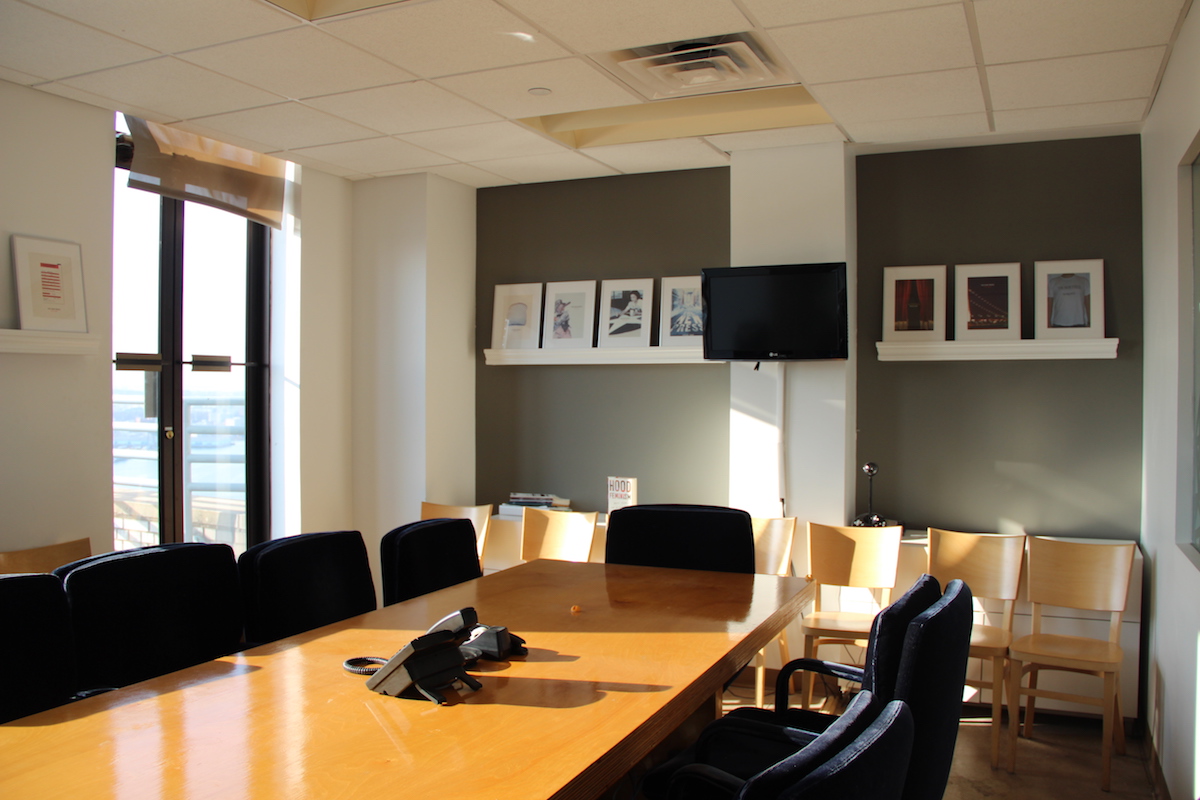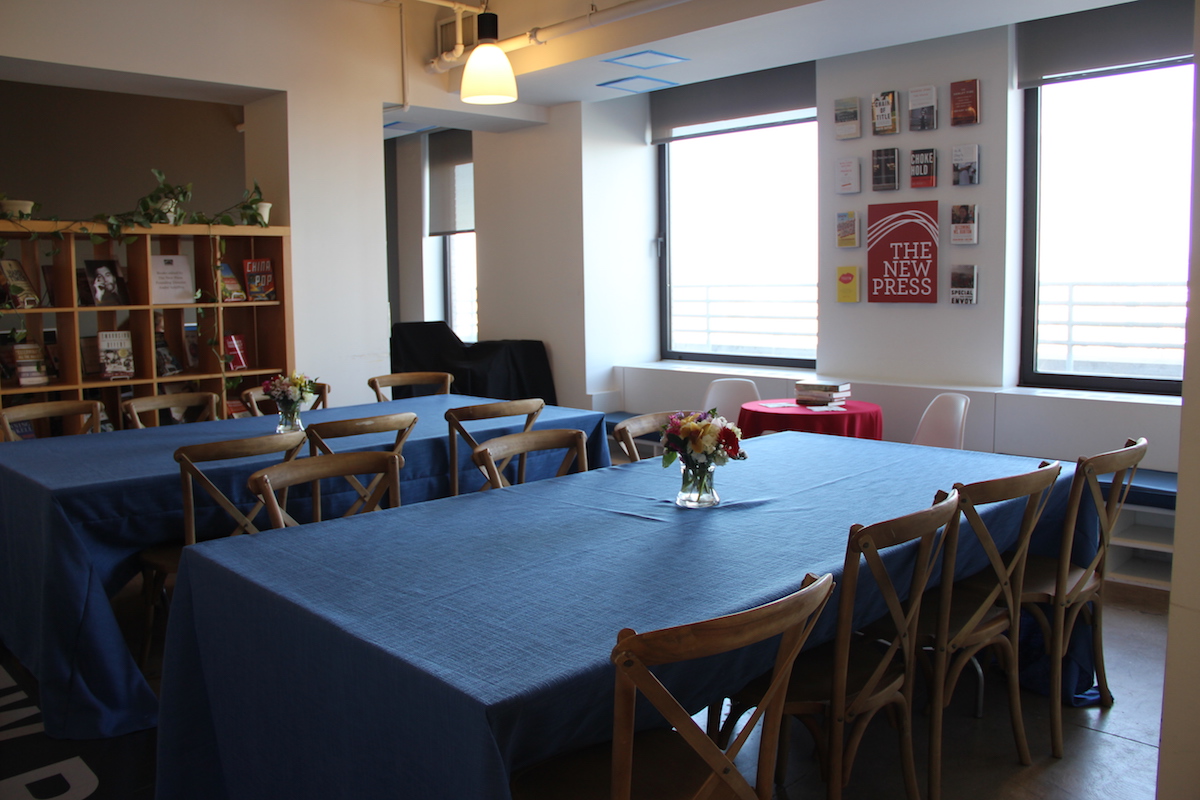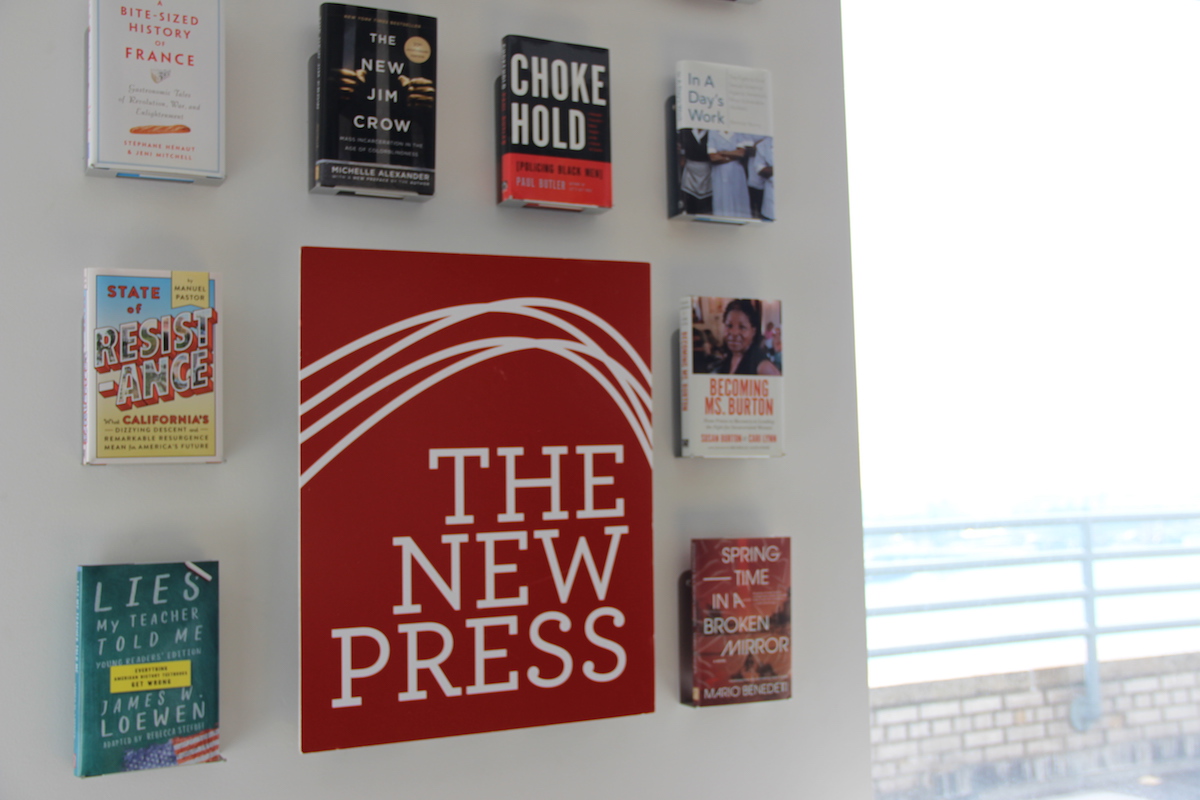Even right now, as most human interactions have been reduced to screens, there’s a particular joy no amount of teleworking can take away: it happens when two people are really, really excited about the same book. This moment came to me and a coworker, most recently, courtesy of The New Press when, last month, it published Mouths of Rain: An Anthology of Black Lesbian Thought, a volume edited by Briona Simone Jones that brings together historically groundbreaking texts from Black luminaries—including Audre Lorde, Beverly Smith, Barbara Smith, and others—with more recent pieces on identity, intimacy, and futurity. Their writings, from poetry to short fiction, analytical essays, and personal histories, form a dialogue across time as they honor and celebrate Black lesbian life.
Working at the intersection of publishing and the progressive movement, The New Press has spent more than a quarter-century supporting the voices that advocate for, in its own words, “a more inclusive, just, and equitable world,” bringing readers titles on racial justice, criminal justice, environmentalism, and other vital progressive perspectives. They addressed the challenges of drawing media attention as an indie publisher, how they maintain a public-interest-focused mission, and the process of helping new authors establish both an audience and a foothold in the publishing world.
*
What are some of the benefits to working at an independent press?
One of the principal benefits, as an editor at an independent press, is that you’re less beholden to the mainstream. You have the leeway to explore your own interests and to immerse yourself in subjects that you’re passionate about, and you can look for overlooked writers and challenging ideas with the hope of being able to give them the platform they deserve. Another benefit of working at an independent press is that, by virtue of our size, we’re a close-knit team. For editors that means sharing ideas and supporting each other on the books we’ve acquired. There’s a very strong spirit of collaboration that I find particularly rewarding. –Ben Woodward, editor

Without resorting to tired and deceptive clichés comparing workplaces to families, I’ll say that—compared to my experience at a massive multinational—an independent press fosters camaraderie between employees, which is irreplaceable when it’s genuine. Because we’re not beholden to a conglomerate or holding company or what have you, there’s a stronger sense of our own identity and mission as a press. This enables us to publish books that many mainstream presses would probably find too controversial or niche. –Emily Janakiram, publicist
I get to participate in much more cross-department work than I would at a Big 5 house. My daily activities stretch across sales, editorial, marketing, and publicity, and it’s great to be able to impact the publishing process at every level. Entry-level roles at indie presses are amazing learning experiences! I also feel that my voice is heard and respected more than it probably would be at a giant corporate publisher. Another great thing about The New Press, specifically, is our nonprofit status. We make lots of connections with foundations, advocacy groups, books-to-prisons organizations, and others, which makes the press feel connected to a wider progressive movement. –Jay Gupta, editorial and academic marketing assistant
“Without unlimited resources, it forces you to be more active and more unconventional in the way you go about acquiring books. You can’t just wait for proposals to come to you.”I think the biggest benefit has to be having colleagues who are so committed to our mission and who go above and beyond for all of our titles. –zakia henderson-brown, editor
We are able to take greater risks on our books and are not ruled by profit and loss analyses or by whether an author already has a platform. In fact, it is often part of our job to help amplify the voices of our authors and to help them establish a platform. Having two streams of revenue—one from book sales and one from philanthropic support from foundations and individuals—is quite liberating. We can be nimble and make fast decisions and trust our collective hive mind on choosing books that matter and that will contribute to important conversations in various spheres. –Ellen Adler, publisher
What are some of the challenges to working at an independent press?
We obviously don’t have the financial resources of larger houses, so we often don’t offer the same kinds of advances that they do. That’s certainly led to many a moment of heartbreak, where a book that we have been excited about sells for an astronomical sum. At the same time, one of the most fulfilling parts of the job comes from having to work under these constraints. Without unlimited resources, it forces you to be more active and more unconventional in the way you go about acquiring books. You can’t just wait for proposals to come to you. –Ben Woodward, editor
As a publicist, I notice that we’re constantly vying for exposure in the media along with the Big 5 and other mainstream presses, because these companies have the resources to acquire and publish high-profile authors, celebrities, and politicians. It takes a lot of strategic and relentless pitching to get our books noticed in the national media, particularly as the book review landscape has shrunk so much. –Emily Janakiram, publicist
As a small organization, sometimes internal processes are more ad-hoc than systematized, which can occasionally result in confusion, especially for new colleagues. –Jay Gupta, editorial and academic marketing assistant
Were there any titles in particular that were game-changers for your business?
The New Jim Crow has completely transformed the way we talk about race and incarceration, and also charted a new course for us as a press to continue publishing trailblazing authors in the criminal justice field. –Emily Janakiram, publicist
The New Jim Crow, of course. And I’d be remiss if I didn’t mention Wage Theft in America (2011), which was before my time. It wasn’t a bestseller but it directly inspired state and local-level legislation to help end the practice of wage theft. Talk about impact! –Jay Gupta, editorial and academic marketing assistant
Well, The New Jim Crow was huge for us, but Strangers in Their Own Land, Thick, Pushout, and Chokehold have also truly been game-changers. –zakia henderson-brown, editor
Our progressive education books—going back to some of our earliest top-selling backlist authors, such as James Loewen, Lisa Delpit, and Kathleen Cushman, to our latest, including Monique Morris and Carla Shalaby—aren’t just game-changers in terms of the sales and attention they’ve achieved but are also the beating heart of our public-interest publishing project. I loved seeing two of our recent education books (both edited by our brilliant editor-in-chief Tara Grove)—Vanessa Siddle Walker’s The Lost Education of Horace Tate and Noliwe Rooks’s Cutting School—on the reading list behind the great “Nice White Parents” podcast! When you’re throwing light on our public education system and the inequalities it reproduces, you’re getting at something that extends far beyond the book trade. –Brian Ulicky, associate publisher
How has the coronavirus crisis changed your work?
The nature of my work hasn’t changed. Editorial work, for the most part, is just plugging away at a computer, and I’m fortunate that my apartment is relatively quiet. I miss the camaraderie of the workplace, but one change that I do appreciate is that I can carve out time during the work day, as opposed to weekday nights and weekends, to edit a manuscript—something that was very difficult to do during the busy workday at the office. –Ben Woodward, editor

Obviously, we’re all working remotely for the time being. This of course is a privilege, compared to the workers who are risking their lives and being forced into physical workplaces every day. But I won’t pretend that it’s something I enjoy; it’s not the same doing this kind of work without face-to-face interaction with my colleagues. The logistics of shipping galleys to media and reviewers have been upended. And of course, in-person book launches and events have been replaced by virtual events, which just aren’t the same in my opinion. –Emily Janakiram, publicist
There’s a bit less opportunity for workplace serendipity without having everyone gathered in our office, but overall, the pandemic hasn’t dramatically altered my work. Perhaps the main challenge has been striking the right balance of communication, as email sometimes feels too formal for a quick question—our company-wide adoption of Slack has been a boon in this regard. –Jay Gupta, editorial and academic marketing assistant
Like many smaller presses, we’re incredibly collaborative, so not being able to pop over to each other’s desks, or run into each other in the kitchen to serendipitously brainstorm or problem solve has been a real drawback (email and Slack are sufficient, but not the same). I think we’ve adjusted well enough to the business challenges, and fortunately, our staff has been able to remain healthy and safe working from home, but I certainly miss seeing my colleagues in person! –zakia henderson-brown, editor
What are some projects you’re particularly excited about at the moment?
Two upcoming books: Refugee High: Coming of Age in America by a brilliant young journalist, Elly Fishman, which follows a handful of refugee students at a Chicago high school over the course of year. The other is The Atlas of Disappearing Places: Our Coasts and Oceans in the Climate Crisis by Marina Psaros and Christina Conklin, which a beautifully illustrated book about the twenty locations across the globe that are threatened from global warming’s effects on our coasts and oceans. –Ben Woodward, editor
Mouths of Rain: An Anthology of Black Lesbian Thought edited by Briona Simone Jones, is a fantastic anthology and should be snatched up by anyone who’s interested in both new and original writing and landmark historical pieces by Black Lesbian writers and thinkers. We’re also publishing the first-ever English translation of Marguerite Duras’ debut novel, The Impudent Ones. And Planet Palm, by Jocelyn Zuckerman is a fascinating though harrowing examination into how palm oil became an indispensable commodity, how it has destroyed communities and ecosystems, along with the appalling conditions that workers—really, slaves—in the industry face. –Emily Janakiram, publicist

I’m very excited about our recent young adult adaptation of Martin Duberman’s biography of Paul Robeson, titled Paul Robeson: No One Can Silence Me. I remember being astounded at Robeson’s incredible life when I first learned about him and couldn’t believe I hadn’t learned about him in my youth. His relative obscurity is an unfortunate testament to the success of the government harassment campaign against him. I was lucky enough to get to work on this book and hope it brings Robeson’s story to a new generation of budding artist-activists. –Jay Gupta, editorial and academic marketing assistant
Maya Schenwar and Victoria Law’s paperback version of Prison By Any Other Name, out in September, and Mariame Kaba and Andrea Ritchie’s No More Police, which will be out next spring. Both titles feel urgent and particularly useful in these times. –zakia henderson-brown, editor
What’s another indie press you love/would recommend?
Pluto Press! They’re a fantastic left-wing indie with Marxist texts on race and feminism. I just ordered Andrea D’Atri’s Bread and Roses, and I have my eye on Innocent Subjects: Feminism and Whiteness by Terese Jonsson. –Emily Janakiram, publicist
I’m going to double down on my Ohio roots and shout out two: Cleveland’s Belt Publishing and Columbus’s Two Dollar Radio. I was lucky enough to have Anne Trubek as an English professor at Oberlin and continue to learn from and admire the work she and the Belt team accomplish for the region and beyond. Two Dollar Radio’s A History of My Brief Body is a favorite book in my house, our copy having traveled immediately from my partner’s night stand (he’s also from Ohio btw) to mine. –Brian Ulicky, associate publisher
I’m a fan of translated fiction and there’s lots of great indie presses in this space! Hard to pick just one, so I’d say New Directions, Deep Vellum, and Europa. –Jay Gupta, editorial and academic marketing assistant
I love what Haymarket is doing in the world, Beacon has always felt like a “sister” press, and, speaking as a poet, Graywolf is in a league of its own :) –zakia henderson-brown, editor
I love and admire so many indie presses and I really appreciate how much we all try to support each other. Archipelago, Haymarket, Europa, Belt, Copper Canyon, Graywolf all come to mind today—each is feisty and committed and publishes wonderful books. By the way, if you put all of the indie presses together everyone would be talking about the Big 6!! –Ellen Adler, publisher



